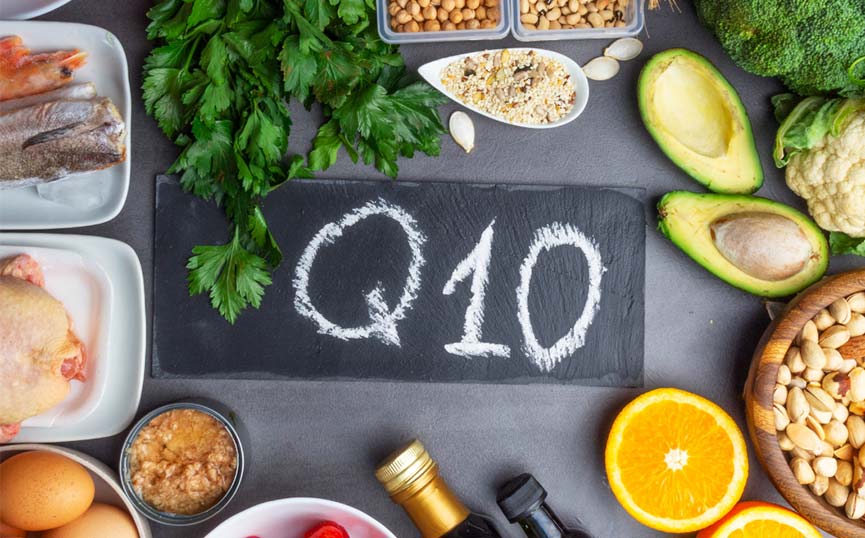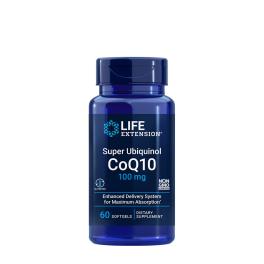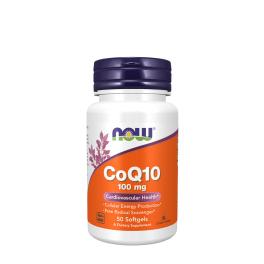Learn about the effects of Q10 on your body!
The effects of Q10 are legendary among dietary supplements. As well as naturally boosting the immune system and stamina, it helps to regulate body weight and slows down the ageing process. Coenzyme Q10 is needed by all people to ensure that the body and organs function normally. The body can produce the compound for some time, but this process slows down with age. To stay fit and glowing for as long as possible, it's worth taking advantage of this fabulous molecule. In this article, we'll find out who, why and how to replenish the Q10 coenzyme in your body.

WHAT EXACTLY IS COENZYME Q10?
Coenzyme Q10 is a type of catalyst responsible for certain biochemical processes. An important nutritional property is that it is fat soluble. It plays a crucial role in aerobic cellular respiration, the energy-producing process of cells. ATP - adenosine-5'-triphosphate - is the smallest unit of intracellular energy transfer. The role of this molecular unit is to transport energy within the cell in metabolic processes - 95% of our body's energy is produced in this way. Q10 coenzyme is found in the organs that require the most energy to function: the heart, liver and kidneys.
What can cause a lack of coenzyme Q10?
Research shows that severe Q10 deficiency can lead to cardiovascular disease. The deficiency can also cause high blood pressure, deterioration of the mind and muscles, and may be linked to diabetes.
Coenzyme Q10 should be supplemented at higher doses for people who have heart problems or have had a heart attack. This compound increases blood flow, so heart patients will be able to perform better mentally and physically.
How does coenzyme Q10 get into our body?
Coenzyme Q10 is a vitamin-like substance that our body only produces for a certain period of time. Typically, the process slows down after the age of 25-30, so it's worth supplementing at this age - but certainly after 30 - even for people who are otherwise perfectly healthy. The best way to expect to benefit from Q10 is to eat the following foods:
- Fish (mainly trout, herring)
- Found in most meats from pork to beef to chicken, but most concentrated in the heart, liver and kidneys.
- Oily seeds: nuts, sesame seeds
- Eggs, dairy products
- Vegetables: broccoli, cauliflower, spinach, pulses
- Fruits: oranges, strawberries
Whatever the vitamin or trace mineral, it's always best to supplement naturally with food. But for Q10, even a well-balanced adult can only get about 25% of what is needed. But we can make up for this with a food supplement. It is important to take coenzyme Q10 with healthy fat to ensure that it is absorbed, otherwise its beneficial effects will not be realised.

Q10 EFFECT: YOU CAN EXPERIENCE THESE POSITIVE RESULTS
1. Binds the free radicals
Ageing, functional decline and certain diseases are all due to oxidative damage to cellular structures. Coenzyme Q10 is the compound of choice to counteract these and is widely used with extraordinary efficacy. Research has shown that Q10 acts inside the mitochondria, protecting membrane proteins and DNA from damage. It neutralises free radicals, which contribute to a variety of otherwise very common diseases at all ages.
2. Expresses its effects in the oxygen transport respiratory chain
The lungs are responsible for the uptake of oxygen and the release of carbon dioxide. It has an important role to play, it works all the time, so it is no wonder that it is an organ that is particularly vulnerable to oxidative stress. Poor antioxidant function, which can be a consequence of low levels of coenzyme Q10, for example, is a direct route to the development of various lung diseases. These include, for example, asthma or chronic obstructive pulmonary disease. A previous study on supplementing asthma patients with Q10 found that they had reduced inflammatory processes and therefore needed less steroid treatment.
3. Reduces the development and worsening of atherosclerosis
Coenzyme Q10 reduces the oxidation of LDL, or 'bad' cholesterol, which is beneficial because oxidised LDL is one of the main causes of atherosclerosis. When supplemented with vitamin E, Q10 further reduces the risk of atherosclerosis.
4. Reduces the risk of heart attack
The amount of coenzyme Q10, also known as ubiquinone, can be reduced in the heart muscle due to disease or age-related conditions. As this compound is responsible for metabolic and energy-producing processes in cells, supplementing it can increase the contractile force of the heart muscle, i.e. increase pump function. By improving conduction, heart rhythm can be normalised: Q10 reduces the risk of heart attack and high blood pressure. It increases physical performance in people with heart disease.
5. Strengthens the immune system
All our organs are affected by oxidative stress. From the brain cells to the cardiovascular system and skin cells, we are exposed to daily effects against which one of the most effective defences is the continuous supplementation of coenzyme Q10. This can also be beneficial for muscle cells, which are also sensitive to the passage of time and environmental stresses. The compound helps to treat and prevent various allergies, asthma and respiratory diseases. Thanks to its antioxidant action, it also makes the body more resistant to acute and seasonal diseases.
6. Slows down the ageing process
The beneficial effects of Q10 cannot prevent the passage of time, but we can "manipulate" the biochemical processes in the body in a positive way. The effects of coenzyme Q10 are not only known from dietary supplements, but are also widely used as an additive in various cosmetic products. This is no coincidence. Regular use can make the skin supple, radiant, youthful and has been shown to reduce the depth of wrinkles. It helps the skin to regenerate faster and to resist harmful effects such as sunlight, heat and cold.
WHAT ARE THE POSSIBLE SIDE EFFECTS OF THE COENZYME Q10?
When it comes to the effects of Q10 on the body, the balance is clearly in favour, but it is also worth noting that unpleasant side effects are rare. It is important to note, however, that even at extremely high doses (3600 mg/day) of coenzyme Q10, no serious or life-threatening risks have been reported in research.
Side effects of Q10
As everyone's body is different, in some cases there may be milder or more serious side effects when taking different supplements. In the case of Q10, the following complaints have been observed in a small proportion of consumers:
- Mild gastrointestinal symptoms - you may experience bloating, diarrhoea, heartburn when you start taking a higher dose (more than 200 mg) of coenzyme Q10.
- Headaches - although coenzyme Q10 is specifically recommended for migraines, it is possible to experience temporary headaches if you are sensitive to it.
- Dizziness - if you feel dizzy, it is worth contacting your GP.
- Skin reactions - redness, mild itching may be experienced.
Contraindications or who should not take coenzyme Q10?
The effect of Q10 may be dangerous for some groups. People with hypoglycaemia are better off avoiding oral supplementation, as Q10 lowers blood glucose levels. Some people sensitive to Q10 reported nausea, headaches and loss of appetite in the study. Pregnant women should only take the compound as a dietary supplement with their doctor's consent. People who are about to undergo surgery should stop taking coenzyme Q10 two weeks before the operation and consult their doctor.
WHAT IS THE RECOMMENDED DOSAGE OF Q10-COENZYME?
Coenzyme Q10 supplementation is generally not recommended under the age of 18, and after that it should only be taken in tablet form after consulting your GP. At this age - until about 25 years of age - you should try to get the daily amount you need through natural nutrition.
Over the age of 30, it is recommended to start with 200 mg daily for 60 days, then reduce the dose to 30 mg. For people with heart disease, a 1200 mg daily course may also be an option, but it is advisable to check with your GP or cardiologist. It is important to take the tablets at a similar time each day and during or after a meal when fatty foods such as cheese, meat, seeds and olive oil have been eaten. For those who need extra supplementation because of a medical condition, it may be necessary to take this supplement twice a day.
One study has reported that the daily dose of 1200 mg should not be exceeded because the effects of Q10 may impair cognitive function in the long term. However, you cannot go wrong with a daily dose of 30-100-200 mg.
If you are taking a permanent medication, be sure to ask your doctor for advice on the best Q10 intake for you. Vitamin360 offers the coenzyme in a variety of dosages and formulations, including tablets, oils and sprays. All of the nearly 60 different products in the webshop are of high quality and available at affordable prices.
The effect of Q10 is unquestionable, as the presence of this compound practically determines how energetic and healthy we are. Replacing it has never been easier. If we start taking it, with a balanced diet and some exercise, we can expect to see a qualitative improvement in our well-being within a short time. You will have more energy, a greater desire to work, and will be more effective in training - in other words, it will have a clear positive effect on your overall mood.





